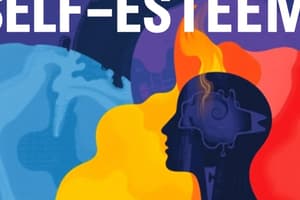Podcast
Questions and Answers
Cuál de las siguientes secciones no es parte esencial de un reporte de un estudio psicológico?
Cuál de las siguientes secciones no es parte esencial de un reporte de un estudio psicológico?
- Metodología
- Análisis del mercado (correct)
- Resultados
- Introducción
En qué sección del reporte se presentan los datos obtenidos de manera gráfica o tabular?
En qué sección del reporte se presentan los datos obtenidos de manera gráfica o tabular?
- Discusión
- Resultados (correct)
- Introducción
- Referencias
Qué aspecto es fundamental mencionar en la metodología del estudio?
Qué aspecto es fundamental mencionar en la metodología del estudio?
- Costo del estudio
- Opiniones personales del investigador
- Número de participantes (correct)
- Estadísticas del país
Cuál de los siguientes no debería ser incluido en la sección de discusión de un reporte psicológico?
Cuál de los siguientes no debería ser incluido en la sección de discusión de un reporte psicológico?
Qué tipo de recomendaciones son clave en el reporte destinado a tutores e instituciones?
Qué tipo de recomendaciones son clave en el reporte destinado a tutores e instituciones?
Flashcards
Reporte de estudio psicológico.
Reporte de estudio psicológico.
Un documento que presenta los resultados de un estudio psicológico, dirigido a los tutores e instituciones involucradas.
Introducción
Introducción
Sección que describe el objetivo del estudio, las preguntas de investigación y la hipótesis.
Metodología
Metodología
Descripción de los participantes, instrumentos utilizados para la recolección de datos y el método de análisis.
Resultados
Resultados
Signup and view all the flashcards
Discusión y recomendaciones
Discusión y recomendaciones
Signup and view all the flashcards
Study Notes
General Structure
- The report should be clear, concise, and easily understandable by tutors and institutions.
- The report should follow a logical flow, presenting findings in a structured manner that builds on background information and method sections.
Introduction
- Briefly introduce the study's purpose and context.
- Highlight the importance of the study in the educational context.
- State the specific research questions or hypothesis being addressed.
- Provide background information on the relevant psychological theories or concepts.
- Clearly define any key terms or variables.
Method
- Describe the participants involved in the study: demographics (age, gender, background), sample size, and criteria for selection.
- Detail the research design (experimental, correlational, qualitative).
- Explain the measurement tools used (questionnaires, interviews, observations). Include details on their reliability and validity.
- Specify the procedures used in data collection, ensuring they are ethically sound.
- Provide information about any potential limitations or biases in the study's methodology.
Results
- Present the findings in a clear and objective manner. Use tables and graphs to illustrate data trends.
- Report descriptive statistics such as means, standard deviations, frequencies, and percentages.
- If applicable, present inferential statistical analyses (e.g., t-tests, ANOVAs, correlations) and associated p-values.
- Clearly describe the relationships between variables.
- Note the degree of association or effect size.
Discussion
- Interpret the results in relation to the research questions and objectives.
- Connect the findings to existing psychological literature.
- Discuss the theoretical implications of the results.
- Address any limitations of the study that might affect the interpretation of findings.
- Offer suggestions for future research in the area.
- Relate the results to practical implications for educators and institutions.
- Highlight specific recommendations based on the study's findings.
Conclusion
- Summarize the main findings of the study.
- Reiterate the study's contribution to the field of psychology and education.
- Restate the significance of the results in relation to specific educational goals.
Reporting Specific Information for Tutors & Institutions
- Focus on actionable insights and recommendations; highlight easily understandable summaries of complex data.
- Use concrete examples to illustrate how tutors or institutions can apply the findings.
- Present clear implications for teaching strategies, curriculum design, or educational interventions.
- Avoid jargon unless absolutely necessary.
- Ensure data is presented with accuracy and clarity to support informed decision-making.
- Include recommendations for further investigation and action plans based on results.
- Provide specific examples of how data can be used in the development of personalized learning strategies.
- Offer suggestions on how to tailor interventions to specific student needs based on the psychological factors identified.
- Suggest resources or tools available to institutions and educators.
Appendix (if needed)
- Supplementary data, questionnaires, raw data.
- Detailed statistical procedures.
- Supporting documents.
- Tables and other figures of critical data (if not included in the main body).
Studying That Suits You
Use AI to generate personalized quizzes and flashcards to suit your learning preferences.




